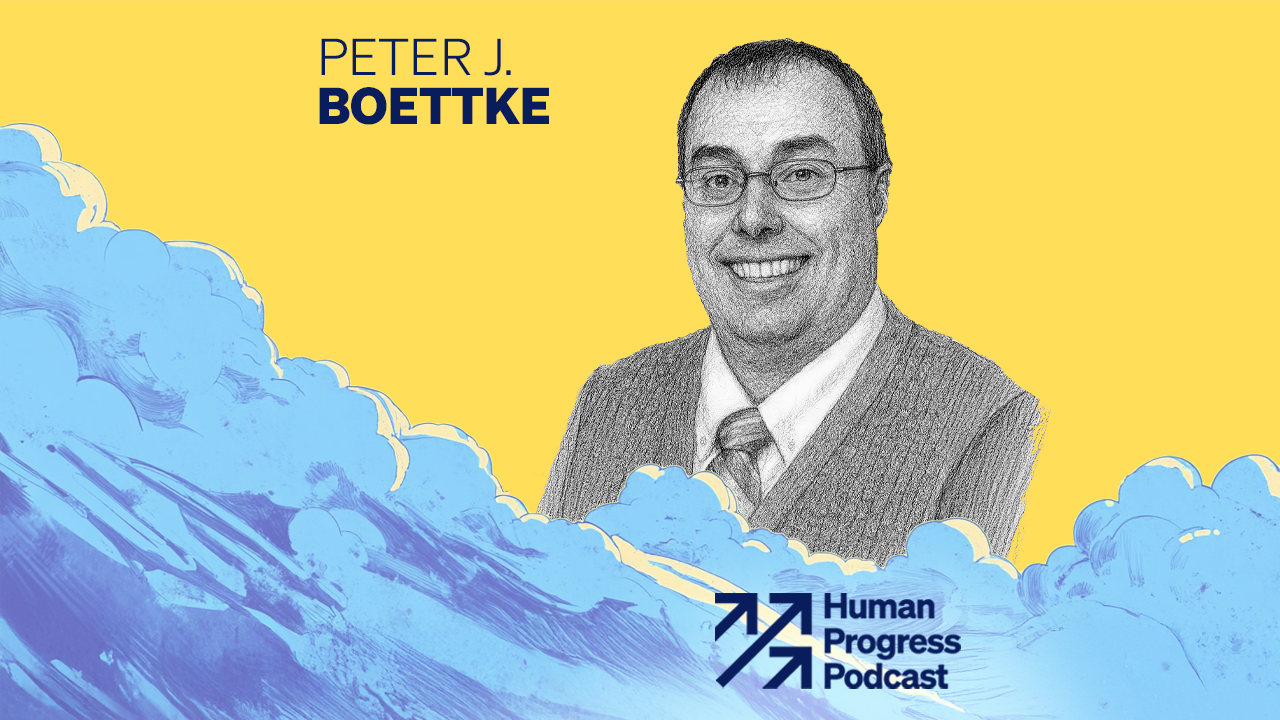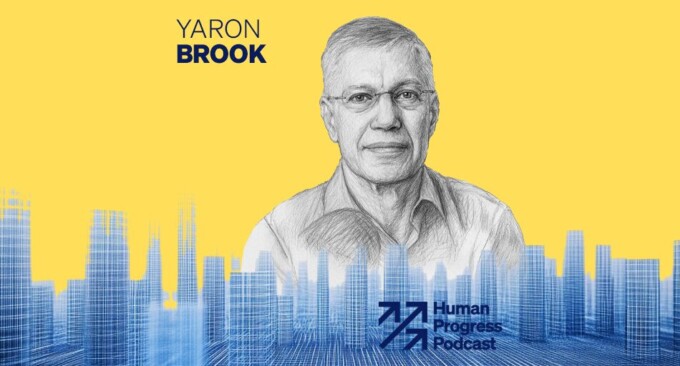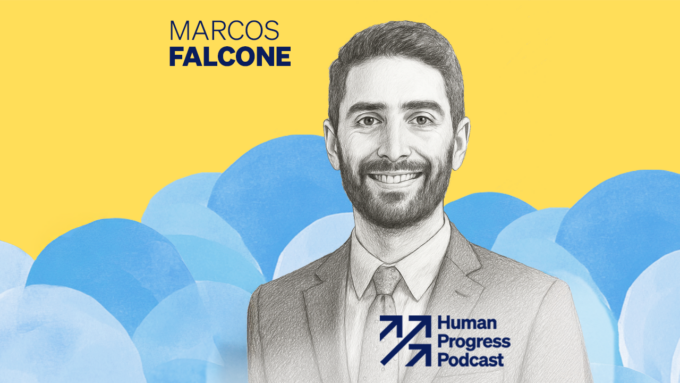Listen to the podcast or read the full transcript here.
Today, I’m speaking to Peter Boettke, a Professor of Economics at George Mason University, who has a new book out with Rosolino Candela called The Historical Path to Liberty and Human Progress.
Let’s start with the big picture. What’s the book about?
This book is based on work that Rosolino and I have been doing for about a decade on the institutional requirements for pursuing productive specialization and social cooperation under the division of labor.
This notion of social cooperation, which is at the core of what Ludwig von Mises wrote about in Human Action, is the foundation for modern economic growth. We’re trying to tell the story of how institutional frameworks throughout history have empowered individuals to pursue productive specialization and realize social cooperation through mutually beneficial exchange.
By institutions, we mean both the formal and informal institutions. So, it’s not only the formal institutions that you might read about in Acemoglu, but also those informal institutions that you would read about in McCloskey. Deirdre McCloskey likes to draw a line between her work and the institutionalist work, but we’re trying to see a joint program. We’re trying to see how all those things fit together.
When we think about economic progress, we often think about free markets and competition. But the free market is also about cooperation. Can you tell us a little more about that?
Yeah, especially among modern economists. Classical economists had a much better notion of the role that markets play in making us more cooperative.
Voltaire says that the Jew, the Gentile, and the Muslim can hate each other, but when they go into the market, the word heathen is left only to those who don’t honor their contracts. That thesis, called doux commerce, has been de-emphasized in modern economics in favor of the idea of competition and market discipline, that we’re going to be constantly seeking the highest rate of return so resources will be allocated in an efficient way, and that after we do that, and after we have exhausted all the gains from trade, we end up continually producing more with less.
All of that is true, but behind it is the idea that after two individuals meet in a market, both thank the other for the exchange. The term “catallaxy,” which Hayek used a lot, means not only exchange, but also turning a stranger into a friend. It’s symbolized by a handshake, meaning mutual agreement. That’s the core of what we are talking about with regard to social cooperation and the division of labor.
In chapter one, you put a lot of emphasis on economic development being a result of private property and the price mechanism. Can you describe briefly why private property and the price mechanism matter?
Prices guide our behavior, profits lure us, and losses discipline us. If we don’t have those signals, we end up engaging in activities that are wealth-destroying rather than wealth-creating. Private property creates those incentives through exchange, which produces prices. So, if you attenuate property rights, the rest of the system gets distorted, and if you try to abolish property rights, the system breaks down.
To make it more concrete for the listener, in somewhere like the Soviet Union, the state has property rights rather than individuals, and therefore prices are not properly generated. You have overproduction of stuff that people don’t want, and underproduction of stuff that people need.
After the collapse of the Soviet Union, a lot of people became unemployed, and there was a lot of suffering. Many blamed that suffering on capitalism, but it was socialism that had employed so many people in unproductive ventures that needed to be shut down because they were reducing national wealth.
Yeah. They had firms for which the value of the inputs was greater than the value of the outputs. They were wealth-destroying. So, they needed to shut those firms down and reallocate their capital and labor more productively.
So, you already summarized the importance of property rights and the price mechanism, but they exist within institutional frameworks. There are different institutional frameworks, such as socialism and capitalism, that create different levels of believable knowledge or information.
How does the information part of it—the knowledge problem—relate to these different institutional frameworks?
When Mises and Hayek asserted that private property and incentives matter, the response by the socialists was, “Oh, wait a minute, the base determines the superstructure. So when you transform the material base, you’re going to transform the superstructure and the attitudes of the individuals within it. All those greedy little things that need to be organized and capitalized are going to go away, and rather than homo economicus, we’re going to have homo sovieticus.”
Mises and Hayek then said that, even making that assumption, those individuals will not have the knowledge necessary to accomplish the task. It’s not only a matter of mobilizing information, but also generating that information.
So, economic information doesn’t just exist out there; it has to actually be produced. Private property and the freedom of contract give rise to prices. Those prices then help entrepreneurs form wishful conjectures about various enterprises. Profits tell them they’re doing the right thing, and losses tell them they’re doing the wrong thing. It’s their ex-ante expectations being defeated by their ex-post realizations that cause the market to constantly churn, agitate, and create new ideas. Without competitive markets, it’s not that the information is difficult to process; it doesn’t exist.
That is very important for the current AI debate.
I’ve encountered arguments that once we have super quantum computers, they will be able to predict what needs to be produced and in what quantities: the ultimate socialist dream. But the problem is that decentralization is fundamental for the production of that information.
Yeah. They think of information as existing outside of the system. Imagine that you have a sand pile, and you’ve got to move it from one place to another. In the old days, we were trying to move the sand with a shovel, and now we’ve developed a backhoe. What Hayek and others argue is that without that generative process, you don’t even have that sand pile to play around with.
Of course, once we have knowledge, it does have to be mobilized. In a book that I wrote with Chris Coyne many years ago called Context Matters, we divide the entrepreneurial moment into three moments: serendipity, search, and seize. The most important moment is serendipity. That notion of actually being aware of a possibility that others hadn’t seen before is the essence of the entrepreneurial moment.
Is that why it’s so difficult for governments to identify and encourage entrepreneurs? Because you don’t know who, out of the 8 billion people, will have that serendipitous moment?
One hundred percent. This is a very Julian Simon point. In the beginning of The Ultimate Resource, he tells a story about the priest at Normandy looking at all the graves, whose eulogy is basically, “who among these could have been the next Mozart? Who among these could have been the next Einstein?” The ultimate resource is the human imagination. And economic thinking that pushes that to the wayside because we can’t model it misses out on understanding innovation and ends up being excessively pessimistic. And, again, there’s the key problem of identifying the institutional conditions most conducive to utilizing human creativity.
Let’s pursue that line of thought. In your book, you talk about “polycentric constitutional order” as leading to the best outcomes.
Can you briefly describe what a polycentric model is?
The best model is from Bruno Frey. He has papers on what he calls functioning, overlapping, and competing jurisdictions. Basically, you have lots of governments with overlapping jurisdictions that citizens can move freely between, depending on the bundle of goods and services they are offered. This puts checks on political actors so that they don’t engage in as much predation.
To put it in a very American sense, imagine American federalism on steroids. Take the basic structure of these United States, the American federalist system, and push it even further so that governance is at the most local level.
This seems close to Eric Jones’s emphasis on the geographical decentralization of preindustrial Europe. Basically, whereas most of the world was ruled by large land empires, Europe was divided into hundreds of different statelets. So there was a horizontal competition, as well as a vertical competition, where your feudal lord had to compete with the king and the clergy, and that competition created a mishmash of different liberties and responsibilities that people could choose from.
Does that qualify?
One hundred percent. I have a very brilliant economic historian colleague named Mark Koyama, who wrote a book with Jared Rubin called How the World Became Rich. It’s a textbook. And I asked Mark, “When did the Eric Jones European miracle thesis get defeated?” And he thinks it’s never been defeated. People just got bored and moved on to other explanations because that’s what they thought they needed to do.
We’re trying to resurrect that idea again in this book: this notion that polycentric governance provides the infrastructure that allows us to pursue productive specialization and realize peaceful social cooperation among greater and greater numbers of people.
My biggest takeaway from your book is that the European miracle was really the result of a multi-century, perhaps even multi-millennial process of gradual liberalization. You write that the “accumulation of liberties leads to institutionalization of liberty, which leads to generalized increased returns, which leads to human progress.”
Thank you for finding that sentence and reading it. That is the heart of the book. Liberty is won through numerous hard-earned battles for particular liberties. Alfred Marshall, the great economist, said that “History doesn’t move in one giant leap. It moves in little marginal steps.” You see these small victories where various oppressed groups are able to push back the oppressor and gain some space for themselves.
In my book, The Struggle for a Better World, I describe this in terms of winning victories against the crown, the military or other forces of violence, the dogma of the church, the bondage of slavery, and the mercantilist interests. These various victories all accumulate until you reach a tipping point that creates an economic transformation.
This issue of transformation is important. If it were simply the case that every liberty we win improves us, we would have a straight line of increasing prosperity instead of a hockey stick. The great economist G. Warren Nutter used to ask his students, “Explain to me how a larva turns into a butterfly.” And then he would pause for a minute and say, “Now try to explain it to me in a Solow growth model.” In economics, we like to think about these things as Solow growth models, but Deirdre McCloskey’s work tells us that a Solow model cannot explain the Great Enrichment, but what can explain it is a transformation akin to a larva turning into a butterfly. That accumulation of liberties, and the moment they get institutionalized, creates a transformation.
You mentioned the Soviet context before, and in the Soviet culture, they had an issue that they called tall poppy syndrome. Which is that when anyone gets ahead, they are cut down rather than celebrated. This is McCloskey’s point: let me give it a go and I’ll make you rich. Well, for a lot of human history, we didn’t let people give it a go. We penalized them if they tried to do something different. So, we needed to get to the point where those accumulated liberties provided enough security that people could think differently and pursue things that no one had done before. That’s how you unleash the creative powers of civilization.
It’s almost like a nuke going off. You have to have a critical mass of whatever it is that you’re trying to blow up, and then eventually you achieve ignition.
It seems to me that this process of liberalization you are describing takes place on two different levels. One is the philosophical or moral level, and the other is the political or economic level. There are these little liberties that get institutionalized into law. For example, you can now trade overseas, there is no longer a monopoly on salt, you can open a new factory without being a member of the guild, and so on. That’s the political-economic level. Then you have the moral level, which is where McCloskey comes in. She says that on top of the political and economic system, you need to have people who are comfortable with you exercising your freedom and doing with your life and with your property what you want.
McCloskey explains that the transaction costs of enforcing a rule are going to rise or fall depending on people’s value systems. So, for example, private property was introduced long before the economic takeoff, so you can’t explain the takeoff using just the formal right to private property. All our liberties rely on informal value systems that lower the costs of enforcing those rights.
Let me just tell you about two reformers in Russia whom I knew. One was Anatoly Chubais, who became the head of privatization in Russia, but at the time was a young academician just like me. Yegor Gaidar was another. In the late 1980s, all these people were reading Western thinkers like Milton Friedman and Hayek. Then, all of a sudden, they became the people in charge.
They were ridiculously young and given all this power, and, prior to them being in politics, they were as hardcore a Friedmanite or Hayekian as you’d meet at any Cato University event. And Gaidar, when he stepped down, what did he create? A giant scientific research center for himself. What did Chubais do? Chubais ended up getting a lucrative contract for a book he never wrote. And he ended up taking control of a state-run energy corporation.
Those guys became oligarchs. They violated the rule of law under the guise of privatization. How are you going to constrain that kind of behavior? You need to have the rules, but you also need to have morals that justify and legitimate those rules.
My last question is as follows: Steven Pinker says that progress is due to the Enlightenment. Deirdre McCloskey says it’s due to liberalism. But in your book, The Historical Path to Liberty and Human Progress, you call liberalism “the political philosophy of the Enlightenment.”
Could we say that those two explanations are really part of the same process of gradual liberalization?
That’s the argument we make.
I think that the Enlightenment project is critical to understanding the co-evolution of both liberal political and legal institutions and liberal economic institutions. And it’s the co-evolution of those two things that, over centuries, gets us to the tipping point, this combustible combination that leads to the world that we benefit from to this day. Despite the growing role of the state, we still have enough space—enough elbow room, as Thomas Sowell says—that ordinary people can do extraordinary things. That’s, I hope, the message that we get across.




